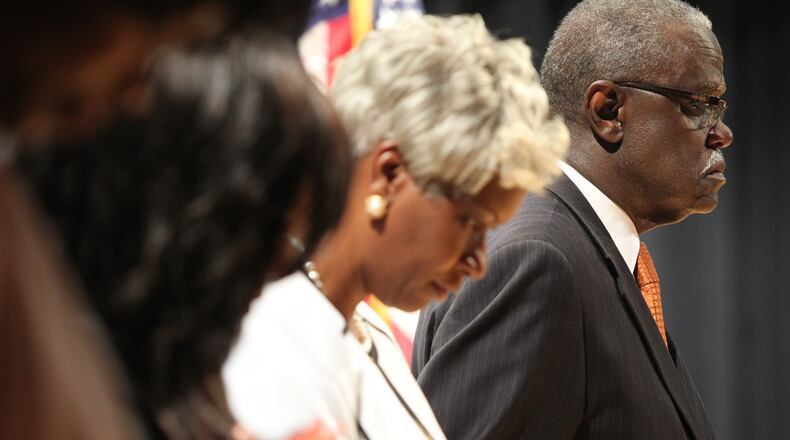Bill Edwards only wants what’s fair.
But what’s fair can change, it seems, depending on circumstance.
When Edwards was a member of the Fulton County commission, he thought it was only fair that new cities in the county bid on the open market to buy the parks and fire stations that were within their borders, rather than purchase them straight from the county at deep discounts.
Now that he's mayor of a new city himself, the lack of other bidders — not to mention the discounts — seems very reasonable.
“I thought it was too little at the time,” Edwards said of the sales prices. “Now, I love it!”
After 14 years on the Fulton County commission, Edwards earned a reputation as a thorn in the side of the county’s new cities. But five months into his term as mayor of the newest city, South Fulton, his thinking has changed as he’s moved from fighting on behalf of the county to pushing against it.
"I find myself on this side," Edwards said. "It's been a challenge, but it's a great challenge."
The irony doesn’t escape him. Nor does it escape the notice of other county leaders, who were used to Edwards’ arguments about every last nuance of city formation.
At the root of his arguing, Edwards said, was a desire to ensure that the leaders of new cities weren’t taking advantage of the residents they left behind — residents he often represented.
But now that he’s on the other side of the equation, he understands they were fighting on their residents’ behalf, just as he was.
When Sandy Springs first pushed for its right to incorporate, Edwards saw it as an affront to the south part of the county. He urged leaders to file suit to keep Sandy Springs from forming.
“I ain’t financing Sandy Springs,” he said in 2005. “They want to destroy and devastate south Fulton.”
In 2008, Edwards had a hard-line stance that the new north Fulton cities should be able to quickly pay their own way for ambulance services, without the help of a subsidy Fulton provided in the past. Today, Edwards is frustrated by what he says are excessively high premiums Fulton expects South Fulton to pay for county services during the transition.
He said it isn’t right that the city is on the hook for matching funds for projects Fulton started more than five years ago. And he doesn’t want South Fulton to have to pay for fixes, like a $1 million culvert project, that were caused by county neglect.
That Fulton County is giving the city a break by letting some police and fire employees work on the transition while being paid by the county isn’t much of a consolation.
“I think they treated Sandy Springs and those other cities better than they treated us,” Edwards said of the county. “We’re like, ‘Hey, man, we used to be y’all. Can you help us a little?’”
As a county commissioner, challenging the cities’ requests, Edwards “was not Mr. Cooperative,” said former Fulton County Commission Chairman John Eaves. Eaves has been on the same side as Edwards, but most recently they were on opposite sides of the table.
“(Now) the dynamics are so interesting,” Eaves said. “It’s almost like a marriage is breaking up and we have to divide the assets.”
Edwards has taken to calling out the county for what he sees as slights against South Fulton residents. Eaves said for the city to succeed, Edwards has to tone down his rhetoric. The county is working with him, he said. But just as he once negotiated to keep some things for the county, the city isn’t going to get all that it asks for.
“He’s blasted the county,” Eaves said. “We cannot have this atmosphere of embattlement. It’s in South Fulton’s best interest to have a cooperative attitude.”
But that’s not exactly how Edwards has operated.
Johns Creek Mayor Mike Bodker said Edwards fought the city “tooth and nail” when it was formed.
“He wanted nothing to do with us back then,” Bodker said. “I joked with him that he came from the dark side to the light. …Everything comes around.”
Bodker said even with the disagreements, South Fulton’s negotiations are less fraught than other cities’ were a decade ago. Joe Lockwood, the mayor of Milton, said he assumes Edwards is seeing the negotiations from a whole new perspective.
Lockwood said the key is to realize that it’s the same residents that are being fought for — that city residents are still county residents.
So has anything changed? Chattahoochee Hills Mayor Tom Reed thinks so.
“He seems more mellow now,” Reed said. “The role he’s in now is harder. When you’re the mayor, you have to think of everybody in the city. It makes you more thoughtful, I think.”
More thoughtful, though, doesn’t mean Edwards has become a pushover when it comes to his residents. Just that he’s started to see what the other new cities were complaining about.
“I thought they were just trying to take what they could,” he said of Sandy Springs. “I wanted to make sure they didn’t take no more than they deserved.”
Edwards said his position against the new cities has changed since he took office in May.
“I never knew I was going to be mayor of a city,” he said. “I tried to get all I could get, like everybody else did. …You want to get the best deal you can. You can’t fault them for that.”
MYAJC.COM: REAL JOURNALISM. REAL LOCAL IMPACT.
The AJC's Arielle Kass keeps you updated on the latest happenings in Fulton County government and politics. You'll find more on myAJC.com, including these stories:
Never miss a minute of what's happening in Fulton politics. Subscribe to myAJC.com.
In other Fulton News:
About the Author
Keep Reading
The Latest
Featured




